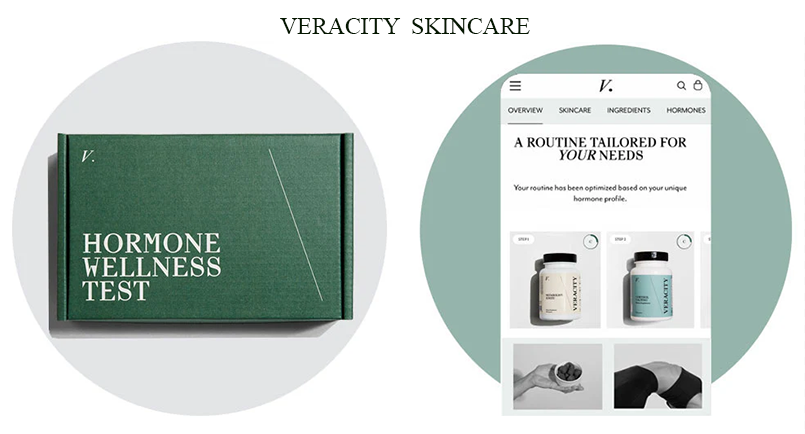
Progesterone is often spotlighted for its role in reproductive health, but its impact on skin health is just as crucial, especially when it comes to maintaining elasticity and moisture. As we age, progesterone levels tend to dip, which can directly influence the skin’s ability to stay firm, hydrated, and resilient. Let’s explore how this hormone supports skin elasticity and moisture and why keeping its levels balanced is essential for a youthful glow.
Contents
- What Is Progesterone and Why Does It Matter for Skin?
- Progesterone’s Role in Skin Elasticity
- Moisture Retention: Keeping Skin Hydrated
- Signs of Low Progesterone in the Skin
- Ways to Support Progesterone Levels for Better Skin
- Topical Solutions to Improve Skin Elasticity and Moisture
- Bringing It All Together: Balancing Progesterone for Youthful Skin
What Is Progesterone and Why Does It Matter for Skin?
Progesterone is a steroid hormone produced primarily in the ovaries, with smaller amounts made by the adrenal glands. Known for its role in menstrual cycles and pregnancy, progesterone also plays an important part in skin structure and hydration. This hormone works with estrogen to keep skin firm and hydrated, supporting skin’s elasticity and overall texture.
How Progesterone Affects Skin Cells
Progesterone interacts with skin cells, particularly fibroblasts, which are responsible for producing collagen and elastin. These proteins are the “building blocks” of skin, providing structure and elasticity. Progesterone stimulates fibroblasts, encouraging them to keep up collagen and elastin production, which helps prevent sagging and maintains skin firmness.
Balancing Act with Estrogen
While estrogen often gets the spotlight for maintaining skin’s youthful appearance, progesterone is a crucial partner in this process. It balances out estrogen’s effects, ensuring the skin doesn’t become overly dry or oily. When progesterone levels decrease, as they often do with age, this balance tips, which can lead to issues like dryness, reduced elasticity, and wrinkles.
Progesterone’s Role in Skin Elasticity
Elasticity is what gives skin its “bounce-back” ability, helping it return to its original shape after being stretched or moved. Progesterone contributes to elasticity by boosting collagen production, keeping skin firm and flexible.
The Connection Between Progesterone and Collagen
Collagen is essential for skin’s structure and strength. Progesterone stimulates collagen production, ensuring that the skin remains firm and elastic. As progesterone levels decrease, collagen production slows, which can lead to skin sagging, fine lines, and wrinkles.
Signs of Reduced Skin Elasticity
When progesterone levels drop, the skin’s elasticity decreases, making it more prone to wrinkles and sagging. Common areas where reduced elasticity is most noticeable include the cheeks, jawline, and neck. If the skin takes longer to “snap back” after being pressed or stretched, it may be a sign that collagen production has slowed.
Moisture Retention: Keeping Skin Hydrated
Progesterone plays a role in regulating the skin’s moisture barrier, which is crucial for keeping skin hydrated and plump. When progesterone levels drop, the skin may struggle to retain moisture, leading to dryness and a dull complexion.
How Progesterone Supports the Skin’s Moisture Barrier
The moisture barrier, or lipid barrier, is a thin layer on the surface of the skin that holds in moisture and keeps out irritants. Progesterone helps maintain this barrier by promoting the production of sebum, the skin’s natural oil. This oil acts as a shield, locking in hydration and keeping the skin smooth and supple.
Dehydration and Its Effects on Aging
When the skin’s moisture barrier is compromised, it loses water more quickly, leading to dryness and dehydration. Dehydrated skin tends to show wrinkles and fine lines more prominently, giving an appearance of accelerated aging. Maintaining progesterone levels can help keep the skin hydrated, reducing the visibility of fine lines.
Signs of Low Progesterone in the Skin
Low progesterone can lead to visible changes in the skin, making it look less youthful. Here are some common signs that progesterone levels might be low:
- Increased Dryness: Skin that feels dry, flaky, or rough may indicate reduced progesterone.
- Loss of Firmness: Skin that appears loose or saggy around the cheeks and jawline.
- Fine Lines and Wrinkles: More noticeable wrinkles, particularly around the eyes and mouth.
- Dull Complexion: A lack of radiance and glow, often caused by poor moisture retention.
If you’re noticing these changes, it may be beneficial to discuss hormone levels with a healthcare provider, as hormonal imbalances can contribute to premature aging of the skin.
Ways to Support Progesterone Levels for Better Skin
While hormone levels naturally fluctuate, certain lifestyle choices and natural supplements may help support balanced progesterone levels, benefiting both skin elasticity and hydration.
Nutrition for Healthy Hormones
- Vitamin C: Found in fruits like oranges, strawberries, and bell peppers, vitamin C can support hormone balance and collagen production.
- Magnesium: A key mineral for hormone health, found in leafy greens, nuts, and whole grains.
- Healthy Fats: Foods like avocados, nuts, and olive oil provide the building blocks for hormone production, supporting skin hydration and elasticity.
These nutrients can aid in maintaining balanced progesterone levels, which in turn supports skin health.
Stress Management
Chronic stress can cause cortisol levels to rise, which can interfere with progesterone production. Engaging in activities that reduce stress, such as meditation, exercise, and hobbies, can help maintain healthier hormone levels.
Natural Supplements
Some women find that natural supplements, such as chasteberry or vitamin B6, may help support progesterone levels. Before starting any supplement regimen, it’s important to speak with a healthcare provider to ensure it’s safe and appropriate for your individual needs.
Topical Solutions to Improve Skin Elasticity and Moisture
While balancing hormones is one way to support skin health, topical treatments can also help improve elasticity and hydration, providing both immediate and long-term benefits.
Retinoids for Elasticity
Retinoids are a popular choice for improving skin elasticity, as they stimulate collagen production. Look for over-the-counter retinols or consult with a dermatologist for prescription options if you’re looking for a stronger treatment.
Hyaluronic Acid for Hydration
Hyaluronic acid is a powerful humectant, meaning it pulls water into the skin, keeping it hydrated and plump. Applying hyaluronic acid serums can provide instant moisture and help maintain a youthful appearance.
Bringing It All Together: Balancing Progesterone for Youthful Skin
Progesterone may not be the first thing you think of when considering skin health, but its role in maintaining elasticity and moisture is significant. By supporting healthy hormone levels and using targeted skincare, you can help your skin stay firm, hydrated, and youthful. From adding hormone-supporting foods to your diet to using the right skincare products, small changes can make a big difference in the appearance and resilience of your skin.

